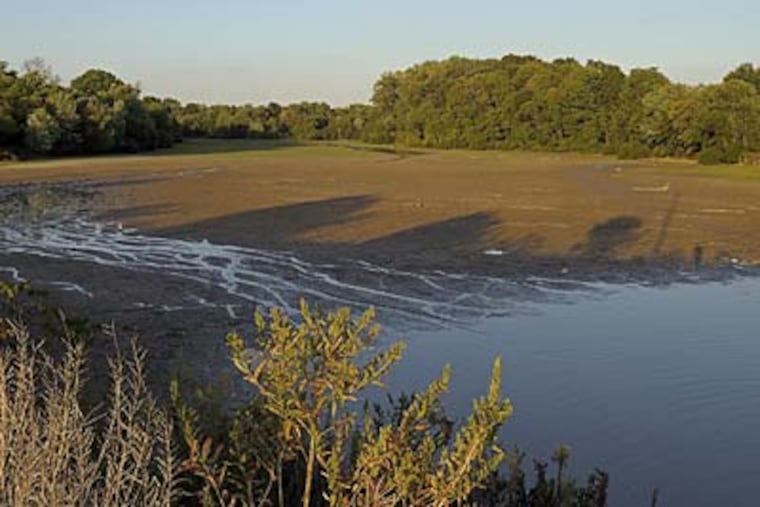Little relief in sight for Philadelphia region's dry spell
It wasn't that long ago that Catherine Poole and her Glenmoore, Chester County, neighbors were under attack from a succession of storms.

It wasn't that long ago that Catherine Poole and her Glenmoore, Chester County, neighbors were under attack from a succession of storms.
Now they have another burgeoning problem: the lack of them.
A dry spell that looks only to intensify has created a spreading harvest of brown lawns, brittle leaves, and dust throughout the region.
With the dry siege entering its third week, the National Weather Service has posted a "red flag" fire danger warning for Wednesday afternoon into the evening, when the air over Philadelphia could mimic that of Las Vegas.
"It's behaving like a desert," said Alex Sosnowski, a meteorologist at AccuWeather Inc., the commercial service in State College, Pa.
For Poole, who lives on a 22-acre farm that is the home of a horse, donkeys, and chickens, the dryness is more nuisance than crisis.
"I don't have pasture left for the animals," she said. "My pond is way down."
However, with little chance of rain through the weekend, and a missing-in-action tropical-storm season, the dry run could empty into something far more serious, said David A. Robinson, a Rutgers University professor who is the New Jersey state climatologist.
"It's a desiccating environment," he said, adding that conditions were being exacerbated by the ultrahot meteorological summer, which ended Aug. 31.
In fact, it has been an extraordinarily warm six months since the snows melted. In the Mid-Atlantic and Northeast, 27 stations reported all-time record highs for the March 1-Aug. 31 period, according to the Northeast Regional Climate Center.
The warmth has lapped into September, this time accompanied by dryness.
"We are in the midst of the worst early-fall drought in parts of New Jersey in several decades," said Robinson.
In Burlington County, rainfall is only 22 percent of normal in the last 30 days, according to the National Weather Service. Not that it's a rain forest across the river: Philadelphia is at 30 percent.
At Robinson's recommendation, the U.S. Drought Monitor, a government-academic partnership that tracks dry conditions, late this week will classify portions of coastal and central New Jersey as being in "severe drought."
Fortunately, precipitation was so generous in winter and spring - and near reservoirs - that water-supply conditions remain decent. Neither the Pennsylvania nor the New Jersey environmental department has issued a drought advisory, nor has the Delaware River Basin Commission.
"We are still in normal operations," said DRBC spokesman Clarke Rupert.
But the region has entered the normally dry time of the season, when the weaker sun means less energy for thunderstorms, and the more-organized storms that come with cooler weather are still weeks away.
Sometimes, hurricanes and their remnants can erase rainfall deficits in a hurry. "This is the time of year when things like Earl turn around a pretty dry summer," said Art DeGaetano, director of the Northeast Regional Climate Center, in Ithaca, N.Y.
But Earl snubbed most of the East Coast, and the prospects for remnant rains anytime soon are negligible. So far, hurricanes have been forming so close to Africa they've had trouble making it all the way across the Atlantic, said Philip Klotzbach, a hurricane expert at Colorado State University.
AccuWeather's Sosnowski said that it was at least remotely possible that the remains of Hermine, now in Texas, could affect the weekend weather around here.
But in the meantime, the dryness is begetting dryness, he said. The humidity is low because it's so dry, and it's so dry because the humidity is so low - thus, the fire risk.
If all-out drought conditions did take hold, it would end a remarkable run. Pennsylvania hasn't issued a drought advisory for the Philadelphia region going on eight years, by far the longest period between droughts since the state began keeping score in 1980.
Said Rupert: "It's something that hasn't been on people's consciousness for quite some time."